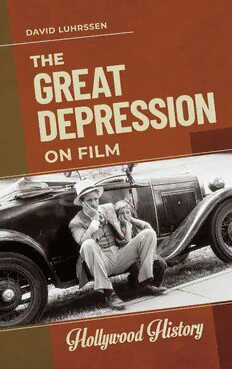
The Great Depression on Film PDF
Preview The Great Depression on Film
The Great Depression on Film Recent Titles in Hollywood History The Vietnam War on Film David Luhrssen The American West on Film Johnny D. Boggs The Civil War on Film Peg A. Lamphier and Rosanne Welch World War II on Film David Luhrssen The Cold War on Film Paul Frazier Sports on Film Johnny D. Boggs The 1960s on Film Jim Willis and Mark Miller The Great Depression on Film David Luhrssen Hollywood History Copyright © 2022 by ABC-CLIO, LLC All rights reserved. No part of this publication may be reproduced, stored in a retrieval system, or transmitted, in any form or by any means, electronic, mechanical, photocopying, recording, or otherwise, except for the inclusion of brief quotations in a review, without prior permission in writing from the publisher. Library of Congress Cataloging-in-Publication Data Names: Luhrssen, David, author. Title: The Great Depression on film / David Luhrssen. Description: Santa Barbara : ABC-CLIO, [2022] | Series: Hollywood history | Includes bibliographical references and index. Identifiers: LCCN 2022025792 | ISBN 9781440877131 (hardcover) | ISBN 9781440877148 (ebook) Subjects: LCSH: Motion pictures—United States—History. | Depressions—1929—United States. | Motion pictures—Social aspects—United States. | Motion pictures—Political aspects—United States. Classification: LCC PN1993.5.U6 L84 222 | DDC 791.430973/09043—dc23/eng/20220707 LC record available at https://lccn.loc.gov/2022025792 ISBN: 978-1-4408-7713-1 (print) 978-1-4408-7714-8 (ebook) 26 25 24 23 22 1 2 3 4 5 This book is also available as an eBook. ABC-CLIO An Imprint of ABC-CLIO, LLC ABC-CLIO, LLC 147 Castilian Drive Santa Barbara, California 93117 www.abc-clio.com This book is printed on acid-free paper Manufactured in the United States of America Contents Series Foreword vii Preface ix Acknowledgments xiii Introduction xv Chronology xxvii 1. Gabriel over the White House (1933) 1 2. My Man Godfrey (1936) 13 3. Black Legion (1937) 27 4. The Grapes of Wrath (1940) 41 5. The Night of the Hunter (1955) 53 6. They Shoot Horses, Don’t They? (1969) 67 7. Sounder (1972) 79 8. Paper Moon (1973) and The Sting (1973) 95 9. Chinatown (1974) 109 10. Bound for Glory (1976) 121 11. The Lindbergh Kidnapping Case (1976) 135 vi Contents 12. Kansas City (1996) 151 13. Cinderella Man (2005) 167 Bibliography 183 Index 189 Series Foreword Just exactly how accurate are Hollywood’s film and television portrayals of American history? What do these portrayals of history tell us, not only about the events they depict but also the time in which they were made? Each volume in this unique reference series is devoted to a single topic or key theme in American history, examining 10–12 major motion pictures or television productions. Substantial essays summarize each film, provide historical background of the event or period it depicts, and explain how accurate the film’s depiction is, while also analyzing the cultural context in which the film was made. A final resources section provides a comprehen- sive annotated bibliography of print and electronic sources to aid students and teachers in further research. The subjects of these Hollywood History volumes were chosen based on both curriculum relevance and inherent interest. Readers will find a wide array of subject choices, including American Slavery on Film, the Civil War on Film, the American West on Film, Vietnam on Film, and the 1960s on Film. Ideal for school assignments and student research, the length, for- mat, and subject areas are designed to meet educators’ needs and students’ interests. Preface The Great Depression (1929–1941) left a deep impression on the imagina- tion of every American who lived through it and continues to cast a shadow a century later. Unlike America’s armed conflicts since the Civil War, fought primarily on distant shores, the Great Depression was a daily struggle for most people in the country. It remains the economic downturn by which all others are measured. In 2008, the subprime mortgage crisis that caused the stock market to plummet was called the Great Recession in an anxious backward glance at an earlier crisis triggered on Wall Street. The children of Depression-era Americans usually heard firsthand sto- ries from their parents, embroidered or not by the vagaries of memory. My mother’s earliest memories include the sheriff evicting her family from their home. Periods of temporary layoff for my grandfather, a skilled mechanic at a steelworks, led to at least one summer of migrant farm work picking sugar beets. As the world enters the third decade of the 21st century, the generation that grew up in the Great Depression has fallen silent. Although the period’s history has been documented, written, and rewritten from many perspectives, no medium has the power to stamp a uniform impression on the imagination of large numbers of people like film. Nowadays life dur- ing the Great Depression is largely recalled by motion pictures, many of them made long after the economic recovery fostered by America’s entry into World War II. Along with radio, movies were the most pervasive form of entertainment during the Great Depression and the word “entertainment” suggests that audiences sought diversion in the cinema. “What movies lacked in realism they supplied in fantasy—escapist fantasies with fairy-tale endings as well as more darkly etched fables that enabled people to tap into their fears and
